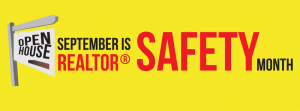September is Realtor Safety Month
The National Association of Realtors has designated September to be Realtor Safety Month. And although according to preliminary figures from the Bureau of Labor Statistics released late last week, real estate workplace fatalities for 2011 are down 37% from their 2010 high, assaults and other violent acts accounted for a rising share of last year’s fatalities. On that note, take a look at these four tips compiled by Melissa Dittmann Tracey at RealtorMag in her article Relationship Management: Four Safety Essentials Every Agent Needs to Know which have been designed to help keep you safer:
1. Be prepared. Find out as much as you can about new clients prior to taking them on home tours with you. Too often agents don’t take the time to properly screen their clients before taking them to showing appointments in vacant homes.
Jan Pringle, the education director with the Kansas City Regional Association of REALTORS® who also teaches agents about safety, says she advises agents to require all potential buyers to first visit the office to review paperwork prior to showings. She’ll then tell her agents to ask clients for their pre-approval letters for a loan. If they don’t have one, she’ll tell agents to send clients for a loan approval next before agreeing to show them a single property.
“This easy step not only protects the agent, but also forms strong bonds with real buyers,” Pringle says. “I don’t think the bad guys will go so far as to be documented for a loan approval. Plus, unmotivated buyers are weeded out as well.”…
2. Bring a flashlight to all of your showings…A large, bright flashlight that fits in the palm of your hand (not the miniature keychain flashlights) can surprisingly serve as a deterrent to would-be predators. … You can use it to shine a light on objects that you want to point out in a home to potential buyers. But it’s also something in your hand that is construed by bad people as an item that a prepared professional carries with them. Police and security personnel carry them. It would cause those who want to do harm against you to think twice…
3. Use your cell phone for safety. Another great tool to help keep yourself safe: Your cell phone.
“You don’t want to have to dig through your pockets or purse to find a phone and then enter a security code just to make a phone call if something goes wrong,” (Adam) Contos says. Instead, he recommends wearing a bluetooth headset while showing properties. The discreet headsets usually allow you to touch a button twice to dial the last phone number you called. “So if you’re walking through a home with a buyer and something turns a little creepy, you can touch the button twice,” Contos says. “You don’t have to say anything to the other person on the line. Continue to show the house but [the person on the other line will] be able to hear you talking in the event that you feel your safety is in jeopardy.”
…
You also can use your cell phone to access mobile apps designed for safety. A growing number of mobile apps such as Agent Alarm, Moby, Real Alert, SafeTrec, and IcePics, among others, allow you to make instant calls to emergency responders. Some apps can even automatically access your GPS coordinates so you can quickly request help when you feel threatened.
4. Slow down. Stop being in such a rush, Contos suggests. When considering REALTOR® safety, many professionals just associate it as prevention of being a victim to a crime such as robbery or an assault. But REALTOR® safety also means taking precautions so you don’t become a victim in other occupational hazards on the job, too, such as car crashes, trips and falls in homes, or even being bit by a dog or other animal when touring homes.
“There are so many occupational hazards other than just being a victim of a crime,” Contos says. “When you get in a hurry, you ignore your surroundings and that can pose a huge safety hazard. It’s not about just getting robbed. It’s also about not getting hurt.”
For example, as you rush to client appointments or travel from listing to listing, many real estate agents are guilty of talking on their phone, texting, or even e-mailing while driving. But what happens if you’re distracted by texting and then hit a pedestrian—a child on a bike?
“A car crash can ruin your career and hurt someone else,” Contos says. “Don’t be distracted when driving; pay attention. We multi-task too much when we’re driving what’s a 5,000-pound weapon.”
Indeed, real estate is one of the top professions for the most car accidents and speeding tickets, according to a 2009 study by the Quality Planning Corp. Researchers analyzed statistics about car accidents and speeding based on profession and found that per year, every 1,000 real estate brokers average 102 car accidents and 39 speeding tickets. Real estate brokers were No. 4 on the list of top 10 most cash-prone professions (behind only doctors, lawyers, and architects).
Contos encourages real estate agents to stop rushing about their day, take the time to plan ahead, and take extra precautions. It’s what putting safety first is all about.
By keeping these and other safety tips in mind, you can be sure that you’re doing everything in your power to ensure the safety and security of yourself, as well as those around you.
And, while we’re on the topic of safety, read my blog Steamboat Springs Area National Forest Safety Tips for some ideas about how to stay safe in the wilderness.
Regards,
Charlie


Links
Steamboat Areas
Popular Searches
Broker Associate
Popular Searches
Didn't find what you were looking for?